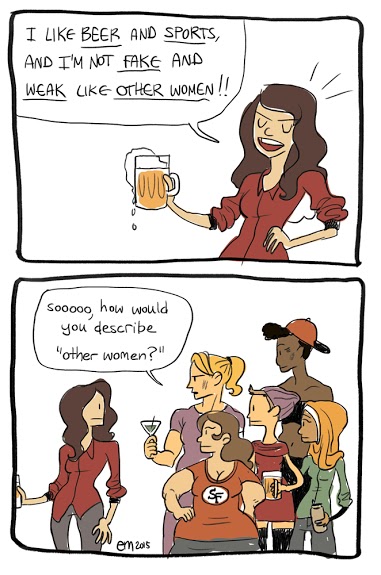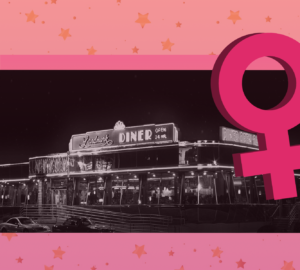
Illustration by Em Barnard.
It’s well known that there are a myriad of tropes for female characters in Hollywood but the “Cool Girl” isn’t discussed nearly as much as the other ones. This is most likely based on a false assumption that it isn’t damaging to women. The “Cool Girl” has many qualities that one might find in the stereotypical man: she drinks beer, loves sports and eats whatever fatty foods she likes without worrying about counting calories (all the while somehow maintaining an impossibly svelte waistline). She is often both successful and adamant about her career, making sure the viewer knows she won’t end up as anybody’s housewife.
“Cool Girl” characters often masquerade as being well-rounded and multidimensional which makes this trope more difficult to recognize than others. Here are some examples of the trope from a well-known movie and TV show.
Andie Anderson in “How to Lose a Guy in 10 Days”
In this film, Kate Hudson plays the quintessential “Cool Girl.” The character’s name, Andie, is gender-neutral just so the viewer immediately knows she’s bro-friendly and doesn’t get thrown off by Hudson’s flowy blonde hair and feminine good looks. Andie is a successful columnist for a woman’s magazine but longs to write deeper pieces because clearly anything suited for a woman’s magazine is beneath her.
At the beginning of the movie Andie consoles a colleague reeling from a breakup. Believing the extent of her co-worker’s heartbreak to be melodramatic, Andie reasons to her, “You only dated the guy a week.” Comparing Andie with the stereotypically hysterical, jilted co-worker shows how she is “different” from other women — she’s in control and would never let a man upset her to that irrational of a degree. Her friend’s heartbreak inspires her to write an article, “How to Lose a Guy in 10 Days.” To research for this article Andie must begin dating Ben (Matthew McConaughey) and then act so crazy that it ensures he dumps her within ten days. You see, Andie must purposefully exhibit the unfavorable habits women portray during a romance because she would never naturally act like anything other than a man’s dream.
Her first date with Ben, the one in which she is allowed to be most like herself, takes place at an NBA game because Andie is a huge sports fan. Sporting a jersey and foam finger, Andie enthusiastically screams and hollers at the players because not only is she a woman that likes sports, but she’s aggressive about it.
In the scenes where Andie isn’t pretending to be every man’s nightmare, she exhibits classically unladylike behavior. While shoving her mouth with a burger at her workplace her boss advises her to “take smaller bites” on her upcoming date. Despite having intentionally acted as obnoxious as possible for the majority of the movie and Ben having only seen glances of her actual personality, Andie doesn’t end up losing the guy after all — how could she? She’s the “Cool Girl.”
Robin Scherbatsky in “How I Met Your Mother.”
Robin Scherbatsky, played by Cobie Smulders, goes beyond shirking all female stereotypes by actually being the stereotype of a man. Robin, once again a unisex name, is a scotch aficionado, workaholic and a commitment-phobe. When she mistakenly thinks her boyfriend of a year, Ted, is proposing to her the first words out of her mouth are “No, no, no, no, no, no. Ted, you cannot do this to me.” While most women would at least be gentle in rejecting a proposal from someone they love, Robin’s anti-marriage instincts have to immediately kick in because she’s just so different from other women, something which is related by the narrator in the pilot episode. Robin is seen in pantsuits far more often than skirts and dresses, but always with a hint of cleavage just so we’re reminded that while she has the personality of a man, she still has sex appeal. This distinguishes her from the typical tomboy.
One of her suitors, Barney, realizes that he has feelings for Robin after the pair spend time alone together and he sees Robin in a suit, drinking scotch and smoking a cigar. The two also play laser tag together and Robin acts as wingman to Barney by helping him hit on a woman at a bar, making it a perfect night of male bonding, sans the all-male part.
Some may assume the “Cool Girl” trope isn’t harmful to women because it so blatantly steers away from any stereotypical female behavior. That assumption couldn’t be more wrong. The “Cool Girl” trope makes men mistakenly think, “You’re not like other girls,” is a valid compliment rather than misogynistic and offensive. It says that women can’t like both sports and shopping, making the “Cool Girl” just as one-dimensional as the “Girly Girl” or any other female trope. Most importantly, and disturbingly of all, is how it insinuates that in order for a woman to be likeable, she must be like a man. Though there are plenty of women whose interests and behaviors may lean more towards “Girly Girl” or “Cool Girl,” the fact of the matter is that most of us fall somewhere in between and expecting women to fit into a mold in order to easily categorize us sets us all up to fail.






















